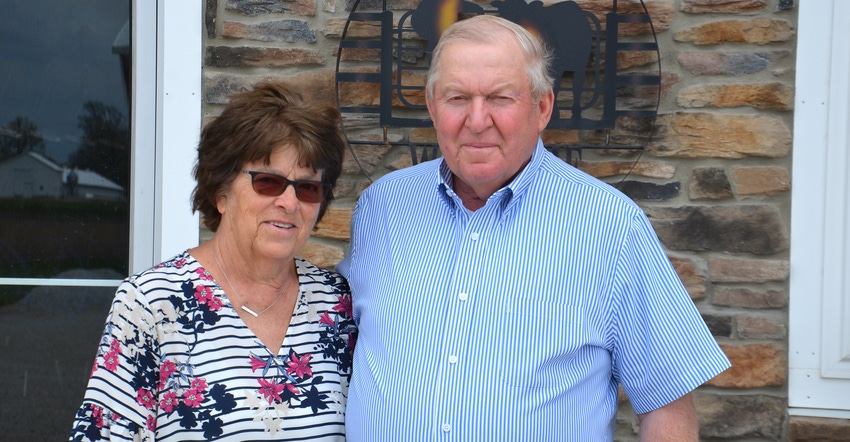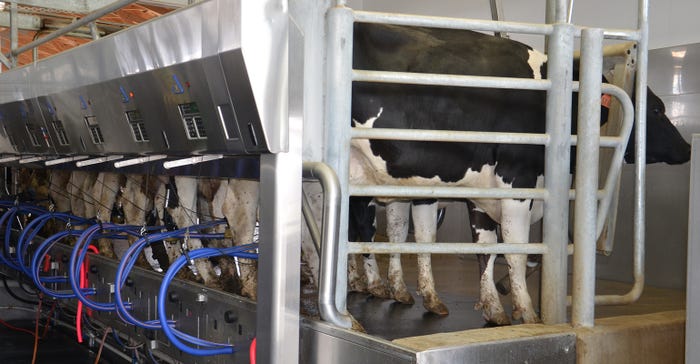
Max Beer, Berne, Ind., learned early that sometimes you must back up words with actions. Max grew up loving dairy cows, and when he was a freshman in high school, his dad, Elmer, made him prove just how much he loved them.
“Dad told me either I would take over milking our 20-cow dairy herd, or he was going to sell the cows,” Max recalls. “I enjoyed the cows, so I made a commitment right then to become a dairy farmer.”
That was no easy task. For the first year, he milked in pail milkers and carried milk to the milk house. Adding a pipeline and bulk milk tank simplified things and allowed him to expand.
Max’s father kept the dairy going while Max trained in the Army Reserves. But after Max’s mother, Edith, died in 1968, Max soon faced another decision. His father moved to town, and Max took over the farm. After marrying a farm girl, Karen, in 1969, Max and Karen’s life adventure was officially underway. They added a parlor in 1970, and expanded as funds allowed, buying land and adding dairy cattle as they could.
Today, Beer Farms Inc. is quite different than in the early ’70s, but the couple still follows the same principles: work hard and manage carefully. Plus, they rely heavily on their four children and 10 grandchildren as part of their family support team. Two of the four kids are directly involved in the farm. All four live within 4 miles of each other and help when needed. Keith manages the dairy operation, and Craig handles the cropping side of the farm business.
“It’s my pleasure to work alongside both of them,” Max says. “And Karen and I both enjoy seeing how much the grandchildren like being around the farm. They would be the fifth generation here.”
Dairying today
As farming and dairying changed, Max and Karen saw an opportunity to specialize and fill a niche for other dairy producers. Mega-dairies were opening in Indiana and elsewhere, and one common challenge for those dairies was breaking first-calf heifers to milk and work in their large operations. The Beers decided to fill the void. Today, they concentrate on freshening up to 250 heifers per month.
“We milk them for the first month in our parlor, then sell them to other dairies,” Max explains. “By the time they leave here, they’re well adjusted to milking in a parlor.
“We’ve had good demand in the past. We’re still moving freshened heifers, but the demand has slowed down now. Everyone in the dairy industry is hurting, facing the challenge of low milk prices, aggravated even more by the pandemic. Our goal, however, is to keep doing what we do best: Prepare heifers for big dairies that focus on milking large numbers of cows.”
The Beers keep and raise all heifer calves, starting them out in a calf barn Max designed for maximum ventilation and sunlight. It’s equipped with an automatic calf-feeding system for nursing calves.
One of the practices they’ve adopted is just-in-time calving. They check heifers ready to calve hourly, and move them to calving pens at the last possible moment.
“We’ve found there is less stress on the animals, and everybody tends to get off to a better start,” Max says. “We believe it’s worth the time invested in making it work.”

COWS IN TRAINING: These first-calf heifers are adapting to milking in a parlor. After a month or so, each one is sold to a larger dairy wanting cows ready to work in their system.

Their crops include corn, soybeans, wheat and alfalfa. They chop up to 400 acres of corn as silage each year, and also make haylage. They grow cover crops on some fields, usually chopping them for forage in the spring.
Beer Farms and neighboring Sommer Farms work together on key cropping operations, primarily making silage and combining. The Beers own forage equipment, and Sommer Farms owns the combine.
“We help each other and do whatever it takes to get the job done, no matter where we’re working,” Max says. “At the end of the year, we get together and settle up. It works well for us.”
Max and Karen Beer at a glance
Age: 71 (Max)
Location: Berne, Adams County, Ind.
Started farming: Max grew up on a general livestock farm. He took over milking cows as a high school freshman. Karen also grew up on a farm.
Married: 1969
Farming entity today: Max and Karen have a niche dairy operation, raising heifers and milking them for a month before selling them to large dairies, plus a sizable crop operation. Son Keith manages the dairy, and son Craig manages crops.
Crops: Corn, soybeans, wheat and alfalfa
Livestock: Dairy cattle, selling up to 250 heifers in milk per month
Tillage methods: Minimum tillage, because they inject manure
Employees: Both full-time and part-time help besides family members
Children: Jodi and (Todd) Lotter, Heidi and (Phil) Schoeneman, Keith and (Lindsey) Beer, Craig and (Julie) Beer, 10 grandchildren, one great-grandchild
Leadership: Beer Farms was showcased for Holstein Association USA on RFD-TV in 2019. The farm hosted the Purdue Farm Management Tour in 1980 and 2015, and has opened for various judging team practices. Max is past-president of the National Red and White Association, president of the 4-H dairy club in Adams County and board president of the Adams County Credit Union. He received a Farm Bureau Young Farmer award early in his career. Karen is a member of the Adams County Council on Aging. Both are active in St. Luke’s Church.
Nominator: Brad Kohlhagen, Purdue Extension ag educator, Adams County
Notable: Karen Beer and Gloria Sommer are sisters and best friends. Gloria and her husband, David, are also 2020 Indiana Master Farmers.
About the Author(s)
You May Also Like




